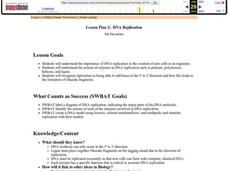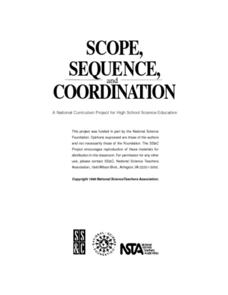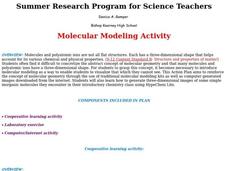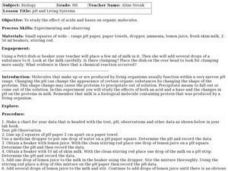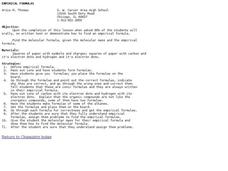Chymist
Esters: An Introduction to Organic Chemistry Reactions
Scratch and sniff an introduction to organic chemical reactions. A creative instructional activity has individuals study the esters commonly used in scratch-and-sniff stickers and advertisements. Following the lab procedure, scholars...
Curated OER
Testing for Life
Students test for organic molecules to determine if a solution contains once living molecules. In this characteristics of life lesson, students test common liquids for the presence of organic molecules, including starch, protein, and...
Curated OER
The Influence of Initiator Concentration on the Molecular Weight of Polystyrene
This in-depth organic chemistry lab walks learners through an investigation of the effect of initiator concentration on the resulting molecular weight of polystyrene. It is important that you use this lesson with experienced chemistry...
Curated OER
DNA Replication
Students create a model of DNA and simulate replication with their models in an activity that uses licorice, colored marshmallows, and toothpicks. Students also label a diagram of replication and indicate major parts of the DNA molecule.
Curated OER
Testing for Lipids, Proteins and Carbohydrates
Young scholars perform tests for the presence of certain macromolecules. In this health and biology lesson, students rotate in groups to three lab stations and perform tests for proteins, lipids, and carbohydrates found in...
Curated OER
Carbon Bonds in Chemistry
Venture into the world of macromolecules with three exciting, distinct laboratory activities. Young chemists examine the forms of carbon and discover how they are associated with atomic arrangement, construct models of carbon-containing...
Serendip
Cells as Molecular Factories
Cells are both made of molecules and make molecules all at the same time! An exploratory lesson provides a means for scholars to research the components of cells made of molecules and also investigate the molecule-producing power of...
Curated OER
How Big is a Molecule?
Young scholars estimate the size of a molecule of oleic acid. They conduct an experiment using chalk dust, water, and oleic acid, solve various calculations, and answer discussion questions.
Cornell University
The Making of Macromolecules
Compare and contrast macromolecules made from the same elements. Young scholars learn how the structure of a molecule has as much influence on a compound as the elements in the molecule. They experiment with molecular model kits to...
Curated OER
Exposure!
Students investigate that chemicals may affect different people in different ways. They also realize that their perceptions of dangerous materials may not be realistic and that the news media may not provide all the information needed to...
Curated OER
DNA and Individual Differences
Middle schoolers list differences between DNA-related terms and create a simple DNA circle map. They order terms including human body, organ, tissue, cell, nucleus, etc. from largest to smallest. They discuss differences and...
Curated OER
Testing for Life
Students discuss food and the food groups and their organic nature. They test 3 different solutions and test for protein, starch and glucose. In addition, they create a master table on the board to collect all the teams results.
Curated OER
Chemical Formulas
Learners examine the structure of molecules, their formula, and percentage composition of each element in the compound. They construct an organic compound with different functional groups using a modeling kit, and draw a 3-D structure...
Curated OER
Molecular Modeling Activity
Learners work together to explain the VSEPR theory and how it relates to molecules. They name electron pairs that can surround the central atom of an organism. They discuss the factors that determine the polarity of a molecule as well.
Curated OER
What is Everything Made of?
Students observe a demonstration on how we see space between water molecules. In this experimental lesson students discover what elements make up the things around them and discuss what they learned.
Curated OER
How Atoms Work
Students analyze the way atoms function and how they combine to form molecules and various compounds. Using a software program, they create a diagram of an atom and write a summary about their functions. They complete a worksheet and...
Curated OER
Properties of Metals
Fifth graders study the properties of metals and use them to identify different properties. In this metal properties lesson students complete a demonstration .
Curated OER
Staying Young with Vitamin E
Investigate how Vitamin E is used to prevent cell aging. Young scientists coat the surface of apples and bananas with oil, Vitamin E, and water. They place each in a petri dish and cover them to observe oxidation over time. They answer 8...
Curated OER
Effects of pH on Organic Molecules
Students investigate the effects of an acid and a base on the structure of milk protein. They observe the changes to droplets of milk when adding ammonia and lemon juice and relate the changes to old, curdled milk. An extension using...
Curated OER
Empirical Formulas
Students investigate empirical formulas for molecules. In this empirical formulas lesson plan, students use paper ions to form formulas and they show these are empirical formulas. They use ions of carbon and hydrogen showing electron...
Curated OER
Circle of Life
Here is a well-designed science lesson that shows learners that everything that organisms do in ecosystems, including running, breathing, burrowing, growing, requires energy. After a thorough discussion of their own eating and drinking...
NASA
The Case of the Wacky Water Cycle
Join the tree house detectives in learning about the processes of the water cycle, water conservation, water treatment, and water as a limited resource.
Curated OER
Polymers all Over the Place
Students investigate properties of common molecules. In this chemistry lesson, students construct polymer models to gain a better understanding of the properties of polymers.
Serendip
UV, Mutations, and DNA Repair
How effective are cells at repairing UV damage? An inquiry-based lesson has learners experiment with organism by exposing them to various levels of UV light and then examining their DNA after a period of time. Pupils test different...
Other popular searches
- Organic Molecules Proteins
- Organic Molecules of Life
- Organic Molecules Lab
- Making Organic Molecules
- Gumdrop Organic Molecules
- 4 Major Organic Molecules
- Class of Organic Molecules
- Organic Molecules or Dna
- Testing Organic Molecules
- Chemistry Organic Molecules
- Chemistry, Organic Molecules



